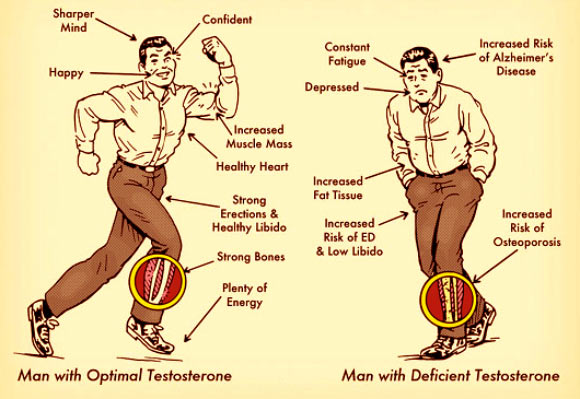What Does High Testosterone Do to a Man?
Author: Brian Hildebrandt, Last Updated: Dec. 12, 2019
The qualities of confidence, ambition, and strength are closely associated with high testosterone levels.
It’s no accident these characteristics are predominantly male. The more testosterone you have, the greater ability for these qualities to be expressed.
Increasing your testosterone has powerful cognitive and physiological effects.
It can enhance your tolerance for stress, helps alleviate fatigue, has mood brightening effects, and improves body composition (reduced fat/increased muscle).
Signs and Symptoms of High Testosterone Levels
- Well-being (reduction in depression and mild euphoria)
- Confidence (reduced social anxiety and greater assertiveness)
- Energy improvements and greater work capacity
- Motivation (greater ambition)
- Sex drive/libido and response times heightened (shorter refractory period)
- Concentration (greater ability to complete complex mental tasks)
- Strength and muscle mass increases
- Body fat reduction and higher basal metabolic rate

Photo credit: artofmanliness.com
Is it Possible to Have Too Much Testosterone?
Testosterone levels higher than 1000ng/dl or 35nmol/L are generally considered “significantly above normal” for men.
Going above that mark means you’re somewhere in the top 2.5% of all men. The bottom 2.5% would put you below 250ng/dl or 9nmol/L serum testosterone.
For the average male, 1000ng/dl corresponds to about 150mg to 200mg of supplemental testosterone per week, depending on the individual’s metabolizing ability.
After witnessing many firsthand reports, going well above higher than normal testosterone dosages can produce profound effects on mental and physical abilities.
What’s interesting to note, most “medical professionals” will tell you nothing beneficial can be gained by going over normal ranges.
More accurately, most doctors will tell you it’s outright dangerous. Strangely this opinion is based on limited to no supporting facts.
It’s been the prevailing wisdom in the medical profession since at least the 1980’s, which has much to do with the popular presses’ negative PR campaigning against steroids in sport.
Research on Testosterone’s Effects
A number of studies have been published supporting testosterone’s effectiveness in supraphysiologic dosages.
No effect on anger, mood and increased sex drive, and increased strength and muscle size.
Increased Testosterone Levels and Evolutionary Psychology
One of testosterone’s psychotropic effects is its ability to raise your sex drive. Its nature’s way of telling you “Get out there and get laid. Don’t focus on one woman in particular. Find what’s available and get the job done.” It’s indiscriminate.
A little simplistic but… men’s primary purpose for sex is to spread their seed as far and wide as possible. It’s a matter of quantity over quality… a direct effect of testosterone on your brain.
On the other hand, it’s more favorable for women to get quality over quantity since she has to carry a child for 9 months and is responsible for the majority of child rearing.
Thats one of the reasons why women’s testosterone is lower. It’s disadvantages for them to have promiscuous sex with random men and get pregnant.
Side Effects of Elevated Testosterone Levels
- Acne (primarily on back and shoulders)
- Minor testicle shrinkage (not necessarily a negative)
- Reduced fertility (can be offset with HCG and/or Clomid)
- Hair Loss (can be decreased or prevented with Propecia (finasteride) and/or Nizoral Shampoo (ketoconazole))
- Enlarged prostate (can be offset by keeping DHT and estrogen in check)
All these side effects can all be mitigated by responsible use and safe practices.
Long Term Elevated Testosterone Levels
One important thing to note… as I’m sure it’s on many of your minds. Will having higher testosterone cause you harm if it’s something you intend on doing long term?
Well it’s not without its risks, and unfortunately there isn’t much long term data supporting either position. It’s something you have to weigh the positives against the negatives.
I’d suggest working with a doctor to keep close tabs on your health markers, most notably lipids and hematocrit (high red blood cells), which tend to get the most skewed with supra-physiological dosages.